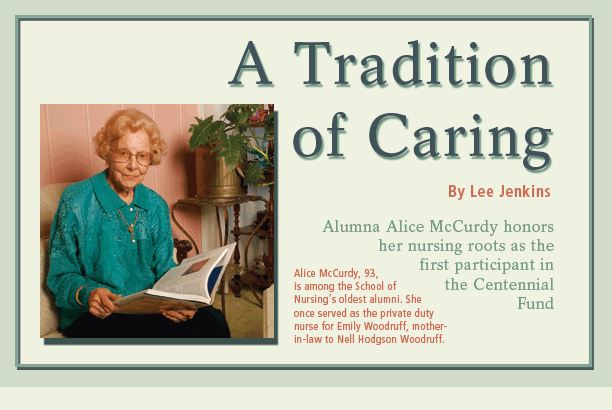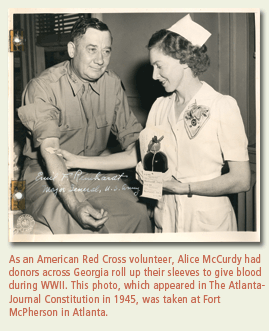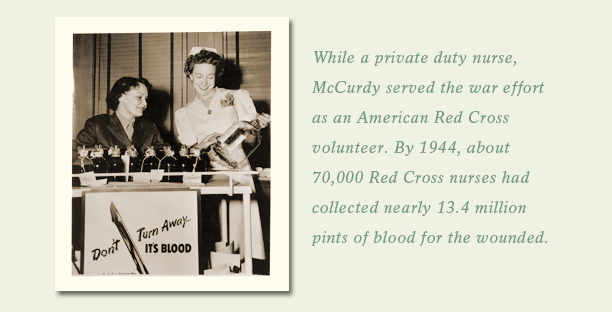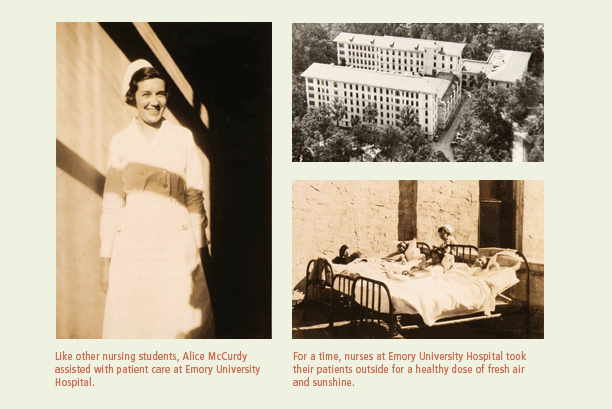















|
 |
 |
 here’s
no question that nursing has changed in the past century. Sixty
to 70 years ago, nurses were often in the employ of well-to-do patients
who needed postoperative, rehabilitative, or home care since few
nursing graduates were employed by hospitals. here’s
no question that nursing has changed in the past century. Sixty
to 70 years ago, nurses were often in the employ of well-to-do patients
who needed postoperative, rehabilitative, or home care since few
nursing graduates were employed by hospitals.
Alice Horton McCurdy, 34N, one of
the oldest alumni from the School of Nursing, was among them. Now
93, the grandmother of 10 and great-grandmother of two still uses
the nursing skills and instincts she learned at Emory to help care
for family members scattered across the country.
McCurdy’s love of nursing began
at a young age. Her father was a pharmacist who died of tuberculosis
when she was 4. As a result, she was raised in South Carolina by
her uncle, Dr. Clinton C. Horton, a 1914 Atlanta Medical College
(now Emory School of Medicine) graduate and country doctor, who
encouraged her to attend nursing school. “I had a choice of
Johns Hopkins or Emory,” she remembers. “Emory was a
beautiful school and closer to home.”
Like other student nurses, McCurdy
attended class during the day and worked nights and weekends at
Emory University Hospital as payment for attending nursing school
(students paid no tuition then). The students’ day and night supervisors were the only professional
nurses employed by the hospital.
The students’ day and night supervisors were the only professional
nurses employed by the hospital.
During her freshman year, Dr. Willis
T. McCurdy, a Medical College of Georgia graduate, stood in front
of the hospital with the other interns, greeting the new nurses.
His gaze fell on the red-haired Alice, whom he would later marry.
McCurdy began his career as a general practitioner in Stone Mountain,
Georgia, a practice he shared with his father, William, an 1898
Atlanta Medical College graduate, and two other family members.
After graduating from Emory University
Hospital School of Nursing in 1934, Alice became a member of the
Fifth District Georgia State Nurses Association’s professional
registry of graduate nurses. “In those days, there were no
recovery rooms or intensive care units in the six major hospitals
in Atlanta,” remembers Edith Honeycutt, 39N, 04H, a former
colleague. “When most of the students graduated, they joined
the registry and became private duty nurses on call for the various
hospitals. These graduate nurses provided both inpatient and home
care to surgery patients, who paid the nurses out of their own pockets.”
In the hospital, graduate nurses attended
to patients as they recovered from anesthetic. “The patients
were very nauseated and often vomited before they were awake,”
explains Honeycutt, who did private duty nursing for the Woodruff
family, including Coca-Cola leader and Emory philanthropist Robert
W. Woodruff. “They could have aspirated without the nurse’s
vigilance.” |
 |
 |
 |
One of McCurdy’s most memorable
private duty patients was Emily Woodruff, Robert’s mother.
“Bob Woodruff took me in as one of the family,” McCurdy
says. “They were very nice people.” They honored McCurdy
for her nursing care with a gold watch, engraved, “To Little
Alice with Love and Appreciation.”
While a private duty nurse, McCurdy
served the war effort as an American Red Cross volunteer. By the
time she married in 1944, about 70,000 Red Cross nurses had collected
nearly 13.4 million pints of blood for the wounded. McCurdy was
one of these nurses, serving as an assistant supervisor for the
Atlanta unit and traveling across the state as needed to collect
blood. She also helped her husband maintain a small after-hours
office in their Stone Mountain home. She provided immunizations,
especially during flu season, and took blood pressures, temperatures,
and medical histories. It was a busy, demanding time.
“Willis delivered so many babies during World War II that
he never slept,” McCurdy says. “He got sick and lost
all of his hair, which came back white and wavy.”
After the war, McCurdy had two children,
Harla McCurdy Brown, who now lives in Pittsburgh, and Jim McCurdy,
71C, 73G. While they were growing up, Alice primarily worked in
the home office, helped with school vaccinations, and was active
in Emory’s Nurses Alumni Association. The home office never
closed. |
 |
 |
 |
“Having
a patient suffering from the DTs [delirium tremens] knock
on the door in the middle of the night does make an impression
on small children,” son Jim recalls.
“It was interesting having
a physician for a father and a nurse for a mother,”
adds Brown. “They would threaten us with a B12 shot
when we got sick.”
In the 1970s, their mother nursed
their father, who suffered from heart disease and emphysema,
until his death in 1977. She still lives in their century-old
home in Stone Mountain with her son.
It’s fitting that someone
who has lived nearly a century—and who has many ties
to Emory—is giving back to her professional roots. McCurdy
is the first person to contribute to the Centennial Fund,
a special, one-time giving opportunity in honor of the nursing
school’s 100th anniversary. Her reason is pure and simple.
“Emory is my school, and I have always loved Emory.”
Lee
Jenkins is an Atlanta freelance writer. |
|
|
Providing a Legacy for the Next
Century
Because
Alice McCurdy, 34N, appreciates the nursing education
she received at Emory, she has transferred some of her
Coca-Cola stock to the School of Nursing to benefit
nursing scholarships.
Her donation is the lead
gift to the Centennial Fund. Through this fund, alumni
and others may provide major one-time gifts for scholarships
and new initiatives for the School of Nursing in honor
of its 100th anniversary. These gifts may include endowments
and significant contributions for scholarships, nursing
education, teaching, research, and facilities. All gifts
will ensure that the School of Nursing continues its
rise as a national leader in nursing education, research,
and clinical practice and as an advocate and resource
for specific health issues affecting the nursing workforce
and heath care delivery around the world.
To learn more about how
to support the Centennial Fund, contact Kim Julian at
(404) 727-6185, (877) 676-0004 (toll free), or kjulian@emory.edu.
|
|
|
| |
|
 |
| |
|
|
|
|
|











